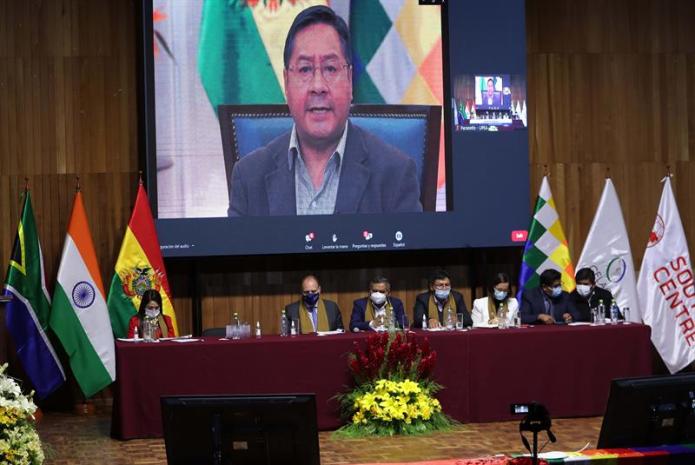RIO DE JANEIRO, BRAZIL – The Government of the Bolivian President, Luis Arce, and the United Nations Development Program (UNDP) asserted this Thursday, May 13, that the request for the liberation of the patents of vaccines against Covid-19 from some countries does not intend to reduce the profits of the pharmaceutical companies, but to provide a global solution to a global problem.
Arce and the regional director of UNDP, Luis Felipe López-Calva, presented this position at the forum “Liberation of patents and intellectual property considerations in the context of covid-19”, held at the Public University of El Alto (UPEA) at the initiative of the Bolivian Foreign Ministry and the international organization.

López-Calva, who participated telematically in the forum, remarked that Latin America continues to be the region most affected by the pandemic, with economic and health consequences, and stressed that “there will be no recovery without universal vaccination.”
“The proposal to suspend the intellectual property rights of vaccines already on the market is not an expropriation movement, it is a movement of justice, of global equity that also recognizes that the companies have already received the economic benefits of their research and that, therefore, it is time to socialize the effect of this research, of this important scientific advance,” he said.
The representative pointed out that “the concentration of the availability of vaccines has been in the rich countries” and considered it “fundamental to increase the supply”.
GLOBAL SOLUTIONS
In a recorded message, Arce said that “it is not a matter of the states wanting to take away the profits of this or that company”, but that “this goes far beyond that”.
The Bolivian president recalled that his country had signed contracts to buy vaccines, but “there is not enough because production is limited to certain States”, or because many governments have limited the export of vaccines for different reasons.
“We do not criticize that, but it is clear to us that this way we are heading for disaster because this happens even with those who have the capacity to pay for vaccines,” he warned.
Arce stressed that “as the pandemic is a global evil, the solution must be global and to get out of it we must all do it”, otherwise “no one will be safe”.
“It is as if it were an apartheid in which the weakest are being condemned and killed,” warned Arce and insisted that if patents are not released, global immunization will not be achieved promptly.
For his part, the Bolivian Chancellor, Rogelio Mayta, said that Bolivia does not seek to dispute “the companies that have profits” for the development of vaccines but ratified that the problem is that even with signed contracts, it has not been able to obtain the required quantities.
For this reason, Bolivia is pursuing three paths: the campaign to obtain the release of patents, the obtaining of “compulsory licenses,” and the modification of the rules so that these licenses do not take so long to obtain.
THE BOLIVIAN CASE
With 13,345 deaths and 324,868 accumulated infections since 2020, Bolivia has entered a third wave of the pandemic after registering a first one between July and August 2020 and the second one at the beginning of this year.
As was the case then, there have been signs of an increase in cases, such as the lack of some medical supplies, the increase in burials due to Covid-19 in cemeteries, or the saturation of hospitals in the eastern region of Santa Cruz, the most affected by the pandemic.
In Bolivia, the generalized immunization against Covid-19 has come up against a shortage of doses, initially denied by the Arce government, who later attributed it to a global problem in the distribution of the drugs, in response to which he initiated an international campaign to request the release of the patents.
The Bolivian chief executive also initiated a procedure before the World Trade Organization (WTO) to obtain a “compulsory license” for the Johnson & Johnson vaccine. He claims the Canadian firm Biolyse Pharma can start producing it and supply up to 15 million doses.
The country’s vaccination plan is being undertaken with Russian Sputnik V, Chinese Sinopharm, AstraZeneca-Oxford, and Pfizer vaccines, among those acquired by the Government, others donated by China, and those obtained through the United Nations Covax mechanism.

